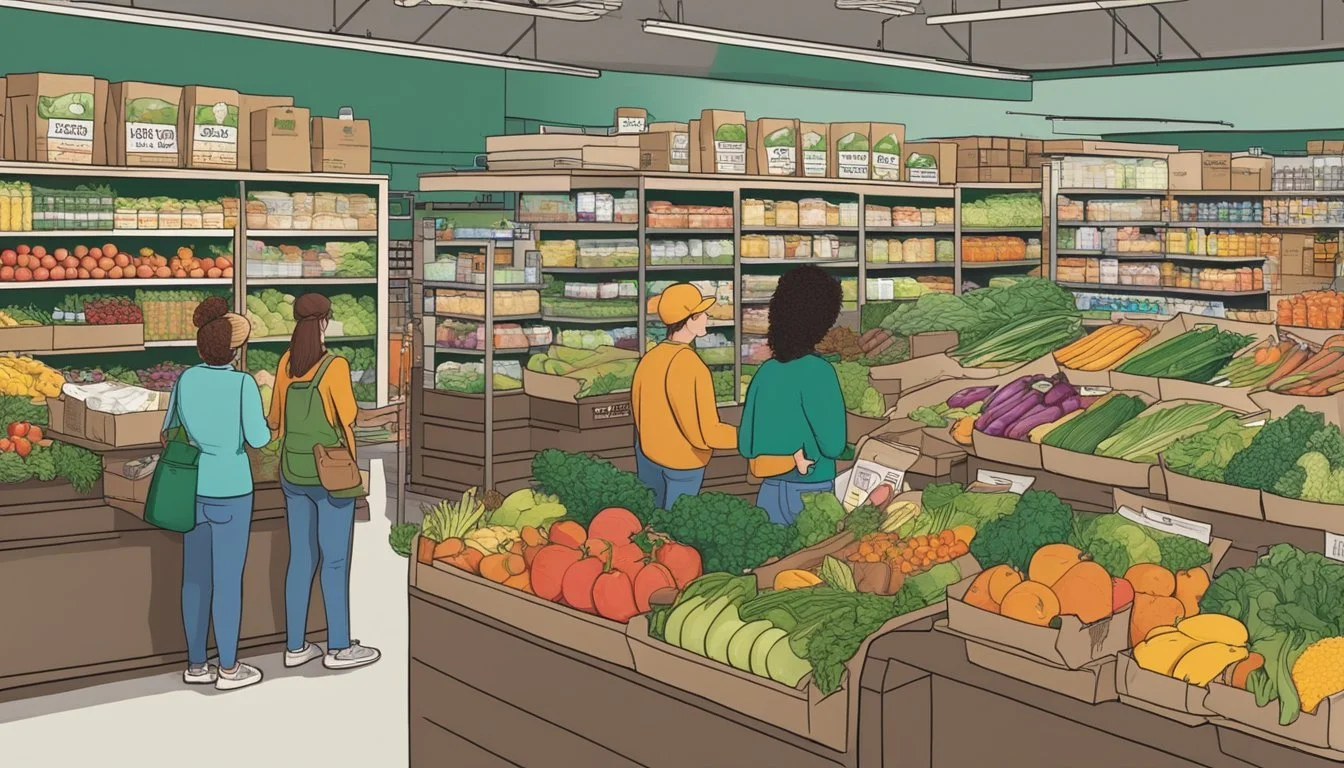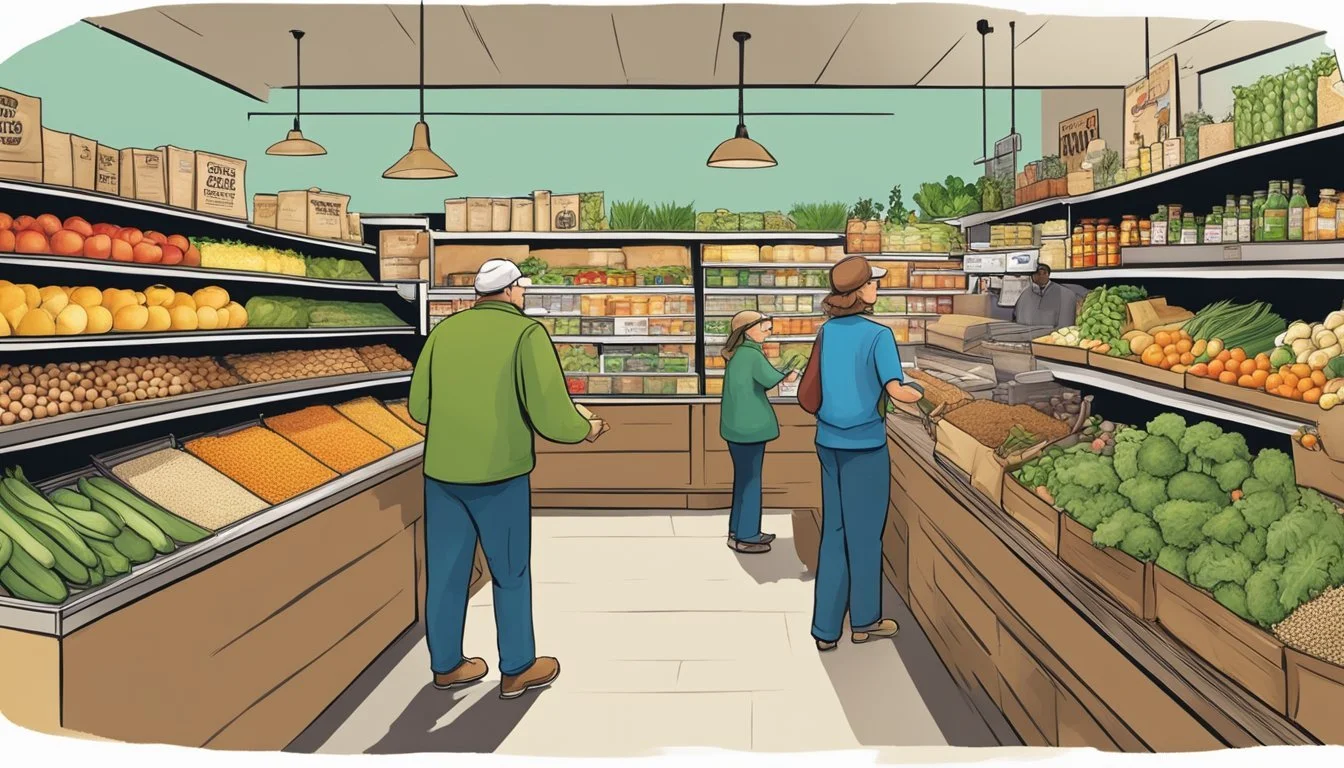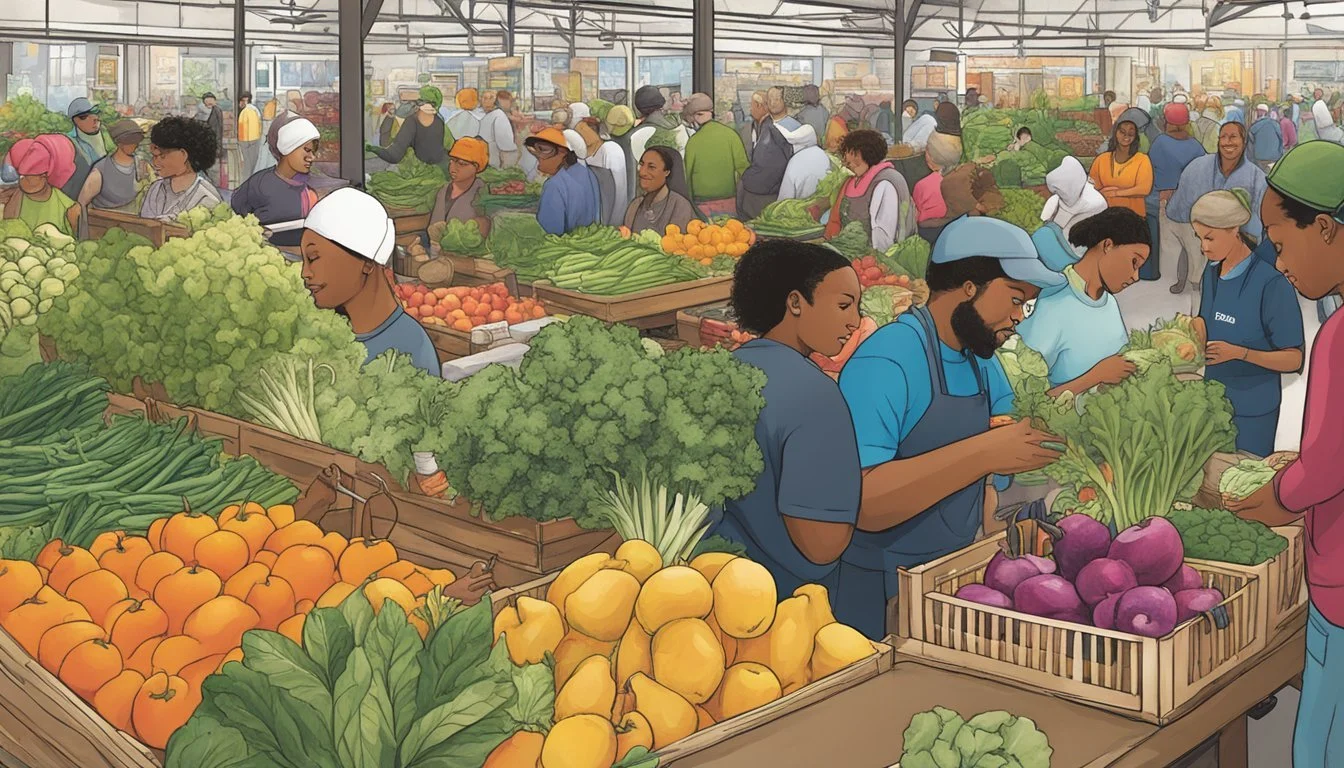Guide to Food Co-Ops in Buffalo, NY
Your Essential Resource
Buffalo, New York is a city that champions community and sustainability, and this spirit is reflected in its thriving food cooperative scene. A food co-op, or cooperative market, is a food distribution outlet organized and owned by members who democratically control the business and its policies. These establishments often prioritize local, seasonal, and organic goods, embodying a farm-to-table ethos that supports local farmers and producers. In Buffalo, the lexicon of cooperative markets is led by names like Lexington Cooperative Market, a fixture in the city's food scene since its founding in 1971.
The cooperative markets in Buffalo are more than just grocery stores; they are pillars of community support fostering a direct connection between consumers and their food sources. Ownership by community members is a defining characteristic, allowing for a strong customer voice in the selection of products and the overall operation. For instance, Lexington Cooperative Market, with its tens of thousands of owners, embodies this collaborative spirit. The co-op doesn't just offer food retail but also acts as a community hub where people come together to share a passion for high-quality, ethically sourced food.
By focusing on providing a vast array of local, organic products, these food co-ops cater to health-conscious consumers and those looking to reduce their carbon footprint. They reflect Buffalo's commitment to cooperative principles, including community economic participation, autonomy, and education. Shoppers in Buffalo's co-ops are investing in a sustainable food future for the city whilst enjoying a shopping experience that aligns with their values of health, community, and sustainability.
History of Food Co-Ops in Buffalo
Food co-ops have a longstanding presence in Buffalo, NY, contributing to the community's access to locally sourced and cooperative food options. The journey of these co-ops is marked by their adaptability and commitment to member-based service models.
The Early Beginnings
In Buffalo, NY, the cooperative movement started to take shape in line with broader national trends. As early as the 20th century, inspired by the Rochdale Principles of cooperative ownership and democracy, local residents began to organize buying groups. This allowed them to leverage collective purchasing power for better prices and control over food sources, effectively planting the seeds for today’s food co-ops.
Growth and Development
Lexington Co-op is a notable example of a food co-op in Buffalo that has experienced significant growth. Starting out as a small initiative to bring high-quality food to the community, it has now expanded to serve a large member base with two locations in the area. By adhering to the cooperative model, these entities emphasize local economic stimulation and support for New York State producers, prioritizing a sustainable food system aligned with community needs. The development of such co-ops reflects a growing awareness and demand for cooperative grocery options.
Current Landscape of Buffalo Food Co-Ops
Buffalo, New York, showcases a vibrant community of food co-ops, focusing on local produce, organic options, and fostering communal health. These cooperative businesses deliver fresh food choices and strengthen the connective tissue of community engagement.
Lexington Co-Op Markets
The Lexington Co-Op operates two sites in Buffalo: one on Hertel Ave and another near Niagara Falls. Known for their wide array of local and organic products, these markets emphasize community involvement and sustainable food practices. In particular, the Lexington Co-Op is deeply invested in sourcing from local farmers, ensuring that the cooperative ethos is rooted in every transaction.
The Healing Grounds Cooperative Cafe
The Healing Grounds Cooperative Cafe is an establishment that embodies the spirit of community and health. They cater to those seeking nourishing, organic food options and stand as a testament to Buffalo's cooperative movement's growth and resilience. Such spaces are vital for nurturing local economies and promoting food accessibility.
Other Notable Co-Ops
Buffalo's co-op scene is enriched by several other initiatives aimed at bolstering food security and community empowerment. Entities like the African Heritage Food Co-op plan to enhance East Buffalo with improved food access, thanks to significant investments from agencies such as New York's Empire State Development. In 2022, a non-extractive loan model was introduced to support these inclusive economic structures without exploiting the community, further solidifying Buffalo's commitment to progressive cooperative businesses.
Benefits of Food Co-Ops to the Local Economy
Food co-operatives in Buffalo, NY, play a crucial role in bolstering the local economy by supporting local businesses and contributing to job creation. By focusing on the procurement and sale of locally sourced products, food co-ops create a sustainable food system that benefits local farmers and the community.
Supporting Local Farmers and Producers
Food co-ops in Buffalo have significant partnerships with local farmers and producers, often engaging with as many as 154 local vendors. These co-operatives are crucial outlets for locally grown produce and goods, ensuring that the revenue generated from these sales stays within the community. Exclusive programs prioritize products from companies that are at least 51% owned and operated by individuals from traditionally underrepresented groups, such as women or people of color. This not only drives local development but also advances inclusiveness in trade.
Local Sourcing: Prioritizing procurement from nearby farms.
Inclusive Trade: Promoting diversity in ownership and operation.
Revenue Retention: Keeping the dollars within the community.
Boosting Local Employment and Revenue
The impact of food co-ops on employment is notable. They offer competitive pay and often exceed national averages for service sector benefits. For instance, they typically provide healthcare benefits to a greater percentage of their workforce compared to national figures.
Employment Opportunities: Creating jobs for the community.
Competitive Benefits: Providing substantial employee healthcare coverage.
Local Investment: These co-ops reinvest in the community, contributing to its economic vitality.
By sourcing from local producers and offering stable employment, food co-ops in Buffalo contribute to creating a robust, self-reliant local economy.
Membership and Participation in Co-Ops
Food co-ops in Buffalo, NY, offer a unique opportunity for community members to engage in a model of shared ownership and participation. Becoming a member often means contributing to a sustainable and inclusive local food system, while volunteer opportunities allow for deeper involvement and support of co-op initiatives.
Becoming a Member
In Buffalo, individuals interested in becoming a member of a food co-op can typically join by purchasing a share or membership. For instance, the Lexington Cooperative Market, known for its focus on local and organic products, allows community members to become owners. Ownership implies having a say in the cooperative's operations and sharing in its profits.
Lexington Cooperative Market Membership:
Cost to Join: (Details not provided in search results; please visit the Lexington Co-op website for the most current information).
Benefits: Shared profits, voting rights, and a strong connection to the local food system.
Process: Interested individuals may apply in-store or online.
Volunteer Opportunities
Volunteer opportunities at food co-ops in Buffalo engage members and non-members alike in various activities that support the co-op's mission. Volunteering can range from assisting in daily operations to participating in community outreach programs. For co-ops like Buffalo Mountain Food Coop, which is a part of the Neighboring Food Co-op Association (NFCA), volunteers play a pivotal role in enhancing the cooperative spirit.
Examples of Volunteer Roles:
Assisting with in-store tasks such as stocking shelves or running checkout counters.
Helping with events and educational workshops for the community.
Education and Community Outreach
Education and community outreach are vital components of food co-ops in Buffalo, NY. They provide residents with the resources and knowledge to make informed choices about their food. Through diverse programs and classes, food co-ops aim to enrich the local community's understanding of nutrition and food sustainability.
Workshops and Cooking Classes
Food co-ops in Buffalo offer various workshops and cooking classes to improve residents' culinary skills and nutrition awareness. In Fall 2021, a cooperative academy graduate may lead sessions on healthy cooking techniques, emphasizing the importance of fresh, locally sourced ingredients. These classes often provide hands-on experience and foster collective consciousness about the impact of food choices on personal health and the environment.
Community Events and Partnerships
Buffalo's food co-ops cultivate strong bonds within the community through events and partnerships. They collaborate with local organizations to host events that celebrate food culture and sustainability. One such partnership might be with an organization that focuses on urban agriculture, which would reflect a commitment to addressing food insecurity and promoting community development. These events serve as platforms for education and engagement, encouraging community members to support the co-op movement and its values.
Health and Nutritional Aspects of Food Co-Ops
Buffalo's food co-ops are known for their commitment to health by providing an abundance of organic and freshly sourced produce and wholesome prepared foods. They contribute to the community's well-being and nutrition through their selection and quality of groceries.
Organic and Fresh Produce
Organic Produce: Buffalo's food co-ops prioritize the availability of organic produce, ensuring that shoppers have access to fruits and vegetables that are grown without synthetic pesticides or fertilizers. Health-conscious consumers can find a wide array of organic options that are often sourced from local farms, guaranteeing freshness and supporting the local economy.
Freshness: They maintain a supply chain that shortens the time between harvest and shelf, which means fresher and more nutritious produce on your table.
Local Farms: Partnering with local producers not only bolsters the local agricultural economy but also offers co-op members and shoppers a seasonal selection of the freshest produce available.
Healthy Prepared Foods
Prepared Foods: Busy lives call for convenient solutions, and Buffalo's co-ops provide a variety of healthy prepared foods. They make nutritious eating convenient without sacrificing quality or flavor. The emphasis is on whole food ingredients and often caters to various dietary needs.
Variety: Food co-ops often feature a constantly updated selection of prepared foods, ranging from salads and sandwiches to hot dishes, all crafted with health in mind.
Ingredients: They prioritize the use of organic and natural ingredients in their prepared meals, offering affordable food options that don't compromise on nutritional value.
Economic and Social Challenges
Buffalo, NY's food co-ops confront tangible economic and social challenges shaped by local demographics and the broader food system. They aim to balance economic sustainability with social mission goals, such as overcoming food deserts and providing affordable nutrition.
Funding and Resources
The process of establishing a food co-op often begins with community funding efforts. A group of 30 individuals each contributed $30 to form the African Heritage Food Co-op (AHFC) in Buffalo, showcasing the cooperative model in action. Resources to sustain such initiatives frequently rely on a mix of member-owner investments, public and private grants, and startup loans. Securing sufficient funding represents a critical barrier, especially as building owners in locales like the historic 283 Carlton St. push for $3 million in investments to develop physical store locations.
Addressing Food Insecurity in Buffalo
Food insecurity in East Buffalo underscores the urgent need for accessible and affordable food sources. The tragic event at a local Tops grocery store exacerbated existing resource scarcity. Local food co-ops, such as the AHFC and collaborative efforts with Buffalo Go Green/Urban Fruits and Veggies, seek to offset this through urban farms and wellness programs. These cooperatives and collaborations endeavor to operate not just as stores but as community-driven solutions to poverty-related food access issues. They stand as a testament to a community's resilience and innovation in the face of economic and social adversity.
Strategic Advancement of Food Co-Ops
In Buffalo, NY, food cooperatives pursue strategic advancement by implementing effective marketing practices and eyeing opportunities for expansion. These strategies uphold their commitment to sustainable equity and regional enhancement.
Marketing and Branding Co-Ops
To strengthen their regional presence, food co-ops in Buffalo invest in robust marketing and branding strategies. They focus on emphasizing the local origin and quality of their products, which serves to create a distinct brand identity that resonates with the community. Methods include:
Engaging Social Media Campaigns: Highlighting member stories, local produce, and community involvement.
In-store Promotions: Featuring regionally produced goods and using shelf tags for easy identification.
Community Partnerships: Working with local businesses and nonprofits to co-sponsor events and initiatives that reinforce their commitment to the local economy and sustainable practices.
In catering to the Buffalo area's desire for sustainable equity, cooperatives tailor their outreach to underline how their business model contributes to a healthier, more equitable food system.
Future Prospects and Expansion
Food co-ops in Buffalo look towards expansion with a focus on sustainable growth. Future prospects include:
Opening additional locations in underserved neighborhoods to increase access to healthy, affordable food.
Expanding the range of products to include more options that are organic, local, and eco-friendly.
Investing in capacity-building programs to empower workers and support their contribution to the co-op's success.
Expansion is planned carefully to ensure that it aligns with the co-op's core principles of promoting regional prosperity and maintaining a commitment to their stakeholders and the environment.
Unique Offerings and Products
Food co-ops in Buffalo, NY, present a unique blend of specialized products that emphasize local, organic, and high-quality ingredients. Shoppers can expect over 2,000 products ranging from artisan cheese to fresh bakery items.
Specialty Grocery Items
Buffalo's food co-ops often showcase an extensive array of grocery store items, with a special focus on local and organic offerings. Customers value the extensive cheese selection, which features both familiar favorites and new, intriguing options. The co-ops’ commitment to sourcing locally not only supports the regional economy but also ensures freshness and quality.
Local Products:
Artisanal cheeses
Specialized health foods
Bulk grains and spices
Organic produce
Fresh Deli and Bakehouse Selections
The co-ops' delis are a highlight, where shoppers can find an assortment of sandwiches, salads, and soups made daily with organic ingredients. The bakehouse section tempts with an array of fresh-from-the-oven goods, including the popular cherry pie, which is a standout for its use of local cherries (how long do cherries last?). Freshness and homemade quality are the cornerstones of these sections.
Deli Offerings:
Gourmet sandwiches
Fresh salads with seasonal ingredients
Homestyle soups
Bakehouse Favorites:
Handmade cherry pie
Assorted artisan bread
Delectable pastries and cookies
Food co-ops in Buffalo deliver a shopping experience rich with gourmet and specialized items that cater to a variety of tastes and preferences.
Involvement with the Buffalo Community
Food co-ops in Buffalo, NY play a crucial role in community development and engagement, leveraging the cooperative model to foster well-being and empower community members.
Events and Activities
Food co-ops are not just places to buy groceries; they often become community spaces that facilitate events and activities fostering local engagement. On Grant Street corner and throughout Buffalo, these co-ops may host workshops, cooking classes, and social gatherings, often free and open to members as well as the general public. These events are tailored to enhance knowledge about healthy eating, sustainable practices, and the benefits of supporting local farmers and producers.
Working Toward a Sustainable Community
At the heart of Buffalo's co-ops lies a deep commitment to sustainability. They strive to deliver more than just economic benefits by acting as community safe havens that prioritize the long-term well-being of both people and the environment. Initiatives may include supporting local agriculture, minimizing food waste through efficient resource management, and offering educational programs about nutrition and food sustainability. By doing so, they reinforce the community's capacity to cultivate a healthier and more sustainable lifestyle for all its members.
Navigating Challenges and Celebrating Successes
In Buffalo, food cooperatives are reshaping the local food landscape by providing access to healthy food and fostering community solidarity. As they navigate the inherent challenges of starting and operating in an underserved market, their triumphs serve as milestones for community empowerment.
Success Stories
Buffalo Rising reports on numerous food co-ops that have left a significant mark on the region. For instance, the African Heritage Food Co-op is a beacon of success, turning food deserts into oases of nutrition and community engagement. This worker cooperative has not only offered fresh produce to Buffalo’s East Side but also fostered a sense of ownership and pride among the members and customers alike. The efforts of the co-op have been well documented in local media outlets, such as Spectrum News and Step Out Buffalo, highlighting its positive impact on food accessibility.
Additionally, ventures like The Healing Grounds Cooperative Cafe and Holistic Co-op Café have merged the concepts of food, health, and holistic living. The cafes, covered by WBFO in a radio interview, serve as central hubs for healthy eating and community events, illustrating how cooperation can create multi-dimensional benefits for neighborhoods.
Overcoming Barriers to Entry
The journey of a food co-op often starts with significant hurdles. Spectrum News outlined some of these challenges faced by cooperatives, such as securing investment and overcoming logistical issues. The African Heritage Food Co-op itself encountered an uphill battle in gathering the financial resources needed, advocating for both public and private investment to establish a permanent brick-and-mortar presence, as reported by Buffalo News.
In general, food co-ops in Buffalo have grappled with issues like high start-up costs, the need for consumer education, and the struggle against established retail giants. However, through community support, these co-ops have turned barriers into stepping stones. Efforts to reinforce food security, especially following tragic events that left the East Side low on resources, have been met with increasing support from the local community, with news channels like WKBW spotlighting these critical endeavors.












